Editor’s note: The following is extracted from Hunting the Grizzly and Other Sketches, by Theodore Roosevelt (published 1902).
In the United States the peccary is only found in the southernmost corner of Texas. In April 1892, I made a flying visit to the ranch country of this region, starting from the town of Uvalde with a Texan friend, Mr. John Moore. My trip being very hurried, I had but a couple of days to devote to hunting.
Our first halting-place was at a ranch on the Frio; a low, wooden building, of many rooms, with open galleries between them, and verandas round about. The country was in some respects like, in others strangely unlike, the northern plains with which I was so well acquainted. It was for the most part covered with a scattered growth of tough, stunted mesquite trees, not dense enough to be called a forest, and yet sufficiently close to cut off the view. It was very dry, even as compared with the northern plains. The bed of the Frio was filled with coarse gravel, and for the most part dry as a bone on the surface, the water seeping through underneath, and only appearing in occasional deep holes. These deep holes or ponds never fail, even after a year’s drought; they were filled with fish. One lay quite near the ranch house, under a bold rocky bluff; at its edge grew giant cypress trees. In the hollows and by the watercourses were occasional groves of pecans, live-oaks, and elms. Strange birds hopped among the bushes; the chaparral cock—a big, handsome ground-cuckoo of remarkable habits, much given to preying on small snakes and lizards—ran over the ground with extraordinary rapidity. Beautiful swallow-tailed king-birds with rosy plumage perched on the tops of the small trees, and soared and flitted in graceful curves above them. Blackbirds of many kinds scuttled in flocks about the corrals and outbuildings around the ranches. Mocking-birds abounded, and were very noisy, singing almost all the daytime, but with their usual irritating inequality of performance, wonderfully musical and powerful snatches of song being interspersed with imitations of other bird notes and disagreeable squalling. Throughout the trip I did not hear one of them utter the beautiful love song in which they sometimes indulge at night.
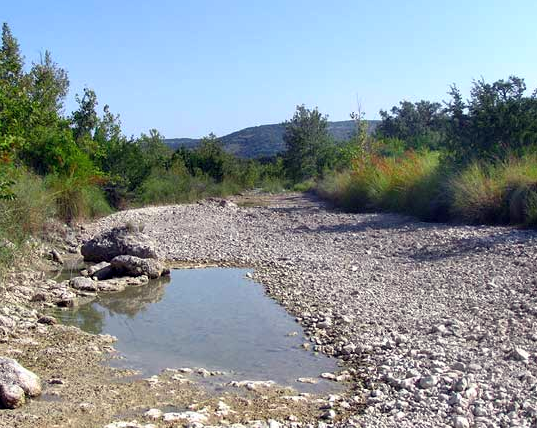
The country was all under wire fence, unlike the northern regions, the pastures however being sometimes many miles across. When we reached the Frio ranch a herd of a thousand cattle had just been gathered, and two or three hundred beeves and young stock were being cut out to be driven northward over the trail. The cattle were worked in pens much more than in the North, and on all the ranches there were chutes with steering gates, by means of which individuals of a herd could be dexterously shifted into various corrals. The branding of the calves was done ordinarily in one of these corrals and on foot, the calf being always roped by both forelegs; otherwise the work of the cowpunchers was much like that of their brothers in the North. As a whole, however, they were distinctly more proficient with the rope, and at least half of them were Mexicans.
There were some bands of wild cattle living only in the densest timber of the river bottoms which were literally as wild as deer, and moreover very fierce and dangerous. The pursuit of these was exciting and hazardous in the extreme. The men who took part in it showed not only the utmost daring but the most consummate horsemanship and wonderful skill in the use of the rope, the coil being hurled with the force and precision of an iron quoit; a single man speedily overtaking, roping, throwing, and binding down the fiercest steer or bull.
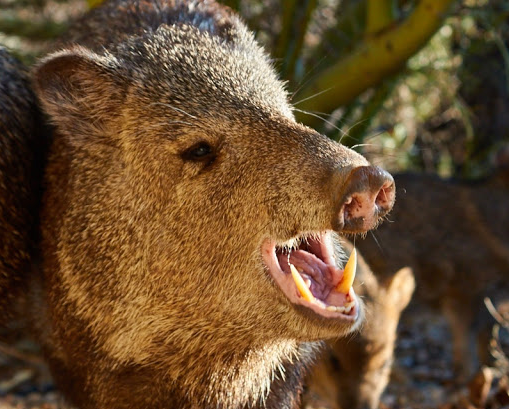
There had been many peccaries, or, as the Mexicans and cowpunchers of the border usually call them, javelinas, round this ranch a few years before the date of my visit. Until 1886, or thereabouts, these little wild hogs were not much molested, and abounded in the dense chaparral around the lower Rio Grande. In that year, however, it was suddenly discovered that their hides had a market value, being worth four bits—that is, half a dollar—apiece; and many Mexicans and not a few shiftless Texans went into the business of hunting them as a means of livelihood. They were more easily killed than deer, and, as a result, they were speedily exterminated in many localities where they had formerly been numerous, and even where they were left were to be found only in greatly diminished numbers. On this particular Frio ranch the last little band had been killed nearly a year before. There were three of them, a boar and two sows, and a couple of the cowboys stumbled on them early one morning while out with a dog. After half a mile’s chase the three peccaries ran into a hollow pecan tree, and one of the cowboys, dismounting, improvised a lance by tying his knife to the end of a pole, and killed them all.
Many anecdotes were related to me of what they had done in the old days when they were plentiful on the ranch. They were then usually found in parties of from twenty to thirty, feeding in the dense chaparral, the sows rejoining the herd with the young very soon after the birth of the litter, each sow usually having but one or two at a litter. At night they sometimes lay in the thickest cover, but always, where possible, preferred to house in a cave or big hollow log, one invariably remaining as a sentinel close to the mouth, looking out. If this sentinel were shot, another would almost certainly take his place. They were subject to freaks of stupidity, and were pugnacious to a degree. Not only would they fight if molested, but they would often attack entirely without provocation.
Once my friend Moore himself, while out with another cowboy on horseback, was attacked in sheer wantonness by a drove of these little wild hogs. The two men were riding by a grove of live-oaks along a woodcutter’s cart track, and were assailed without a moment’s warning. The little creatures completely surrounded them, cutting fiercely at the horses’ legs and jumping up at the riders’ feet. The men, drawing their revolvers, dashed through and were closely followed by their pursuers for three or four hundred yards, although they fired right and left with good effect. Both of the horses were badly cut. On another occasion the bookkeeper of the ranch walked off to a water hole but a quarter of a mile distant, and came face to face with a peccary on a cattle trail, where the brush was thick. Instead of getting out of his way the creature charged him instantly, drove him up a small mesquite tree, and kept him there for nearly two hours, looking up at him and champing its tusks.
I spent two days hunting round this ranch but saw no peccary sign whatever, although deer were quite plentiful. Parties of wild geese and sandhill cranes occasionally flew overhead. At nightfall the poor-wills wailed everywhere through the woods, and coyotes yelped and yelled, while in the early morning the wild turkeys gobbled loudly from their roosts in the tops of the pecan trees.
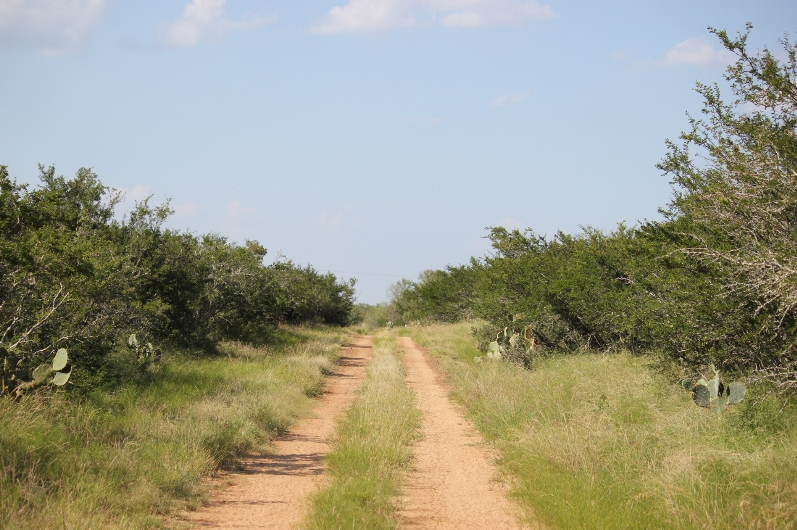
Having satisfied myself that there were no javelinas left on the Frio ranch, and being nearly at the end of my holiday, I was about to abandon the effort to get any, when a passing cowman happened to mention the fact that some were still to be found on the Nueces River thirty miles or thereabouts to the southward. Thither I determined to go, and next morning Moore and I started in a buggy drawn by a redoubtable horse, named Jim Swinger, which we were allowed to use because he bucked so under the saddle that nobody on the ranch could ride him. We drove six or seven hours across the dry, waterless plains. There had been a heavy frost a few days before, which had blackened the budding mesquite trees, and their twigs still showed no signs of sprouting. Occasionally we came across open space where there was nothing but short brown grass. In most places, however, the leafless, sprawling mesquites were scattered rather thinly over the ground, cutting off an extensive view and merely adding to the melancholy barrenness of the landscape. The road was nothing but a couple of dusty wheel-tracks; the ground was parched, and the grass cropped close by the gaunt, starved cattle. As we drove along buzzards and great hawks occasionally soared overhead. Now and then we passed lines of wild-looking, long-horned steers, and once we came on the grazing horses of a cow-outfit, just preparing to start northward over the trail to the fattening pasture. Occasionally we encountered one or two cowpunchers: either Texans, habited exactly like their brethren in the North, with broad-brimmed gray hats, blue shirts, silk neckerchiefs, and leather leggings; or else Mexicans, more gaudily dressed, and wearing peculiarly stiff, very broad-brimmed hats with conical tops.
Toward the end of our ride we got where the ground was more fertile, and there had recently been a sprinkling of rain. Here we came across wonderful flower prairies. In one spot I kept catching glimpses through the mesquite trees of lilac stretches which I had first thought must be ponds of water. On coming nearer they proved to be acres on acres thickly covered with beautiful lilac-colored flowers. Farther on we came to where broad bands of red flowers covered the ground for many furlongs; then their places were taken by yellow blossoms, elsewhere by white. Generally each band or patch of ground was covered densely by flowers of the same color, making a great vivid streak across the landscape; but in places they were mixed together, red, yellow, and purple, interspersed in patches and curving bands, carpeting the prairie in a strange, bright pattern.
Finally, toward evening we reached the Nueces. Where we struck it first the bed was dry, except in occasional deep, malarial-looking pools, but a short distance below there began to be a running current. Great blue herons were stalking beside these pools, and from one we flushed a white ibis. In the woods were reddish cardinal birds, much less brilliant in plumage than the true cardinals and the scarlet tanagers; and yellow-headed titmice which had already built large domed nests.
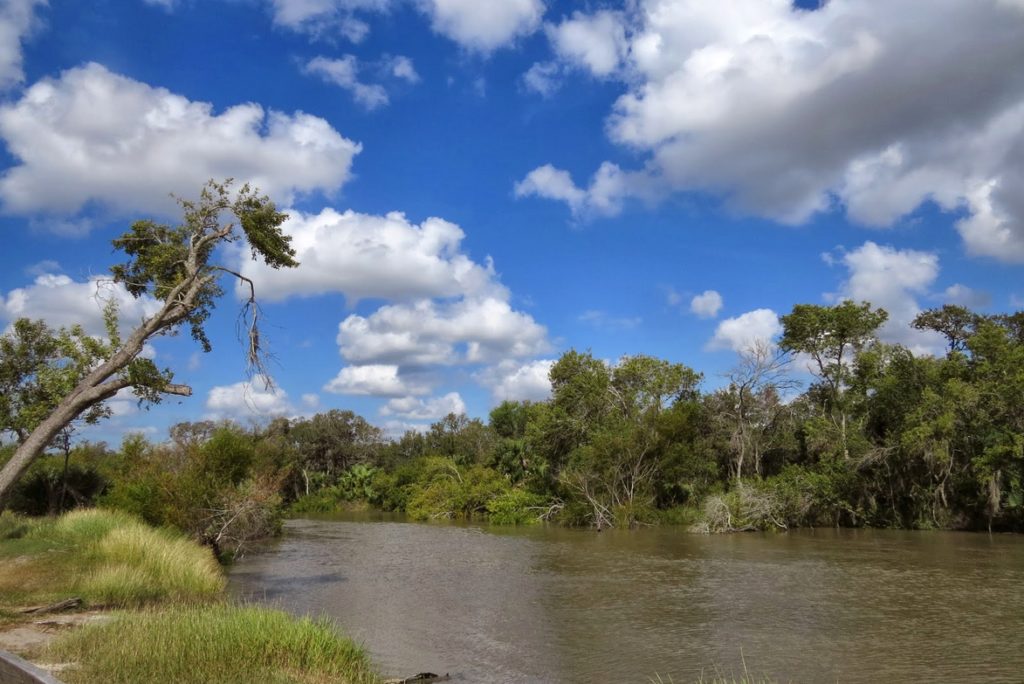
In the valley of the Nueces itself, the brush grew thick. There were great groves of pecan trees, and ever-green live-oaks stood in many places, long, wind-shaken tufts of gray moss hanging from their limbs. Many of the trees in the wet spots were of giant size, and the whole landscape was semi-tropical in character. High on a bluff shoulder overlooking the course of the river was perched the ranch house, toward which we were bending our steps; and here we were received with the hearty hospitality characteristic of the ranch country everywhere.
The son of the ranchman, a tall, well-built young fellow, told me at once that there were peccaries in the neighborhood, and that he had himself shot one but two or three days before, and volunteered to lend us horses and pilot us to the game on the morrow, with the help of his two dogs. The last were big black curs with, as we were assured, “considerable hound” in them. One was at the time staying at the ranch house, the other was four or five miles off with a Mexican goat-herder, and it was arranged that early in the morning we should ride down to the latter place, taking the first dog with us and procuring his companion when we reached the goat-herder’s house.
We started after breakfast, riding powerful cow-ponies, well trained to gallop at full speed through the dense chaparral. The big black hound slouched at our heels. We rode down the banks of the Nueces, crossing and recrossing the stream. Here and there were long, deep pools in the bed of the river, where rushes and lilies grew and huge mailed garfish swam slowly just beneath the surface of the water. Once my two companions stopped to pull a mired cow out of a slough, hauling with ropes from their saddle horns. In places there were half-dry pools, out of the regular current of the river, the water green and fetid. The trees were very tall and large. The streamers of pale gray moss hung thickly from the branches of the live-oaks, and when many trees thus draped stood close together they bore a strangely mournful and desolate look.
We finally found the queer little hut of the Mexican goat-herder in the midst of a grove of giant pecans. On the walls were nailed the skins of different beasts, raccoons, wild-cats, and the tree-civet, with its ringed tail. The Mexican’s brown wife and children were in the hut, but the man himself and the goats were off in the forest, and it took us three or four hours’ search before we found him. Then it was nearly noon, and we lunched in his hut, a square building of split logs, with bare earth floor, and roof of clap-boards and bark. Our lunch consisted of goat’s meat and pan de maiz. The Mexican, a broad-chested man with a stolid Indian face, was evidently quite a sportsman, and had two or three half-starved hounds, besides the funny, hairless little house dogs, of which Mexicans seem so fond.
Having borrowed the javelina hound of which we were in search, we rode off in quest of our game, the two dogs trotting gaily ahead. The one which had been living at the ranch had evidently fared well, and was very fat; the other was little else but skin and bone, but as alert and knowing as any New York street-boy, with the same air of disreputable capacity. It was this hound which always did most in finding the javelinas and bringing them to bay, his companion’s chief use being to make a noise and lend the moral support of his presence.
We rode away from the river on the dry uplands, where the timber, though thick, was small, consisting almost exclusively of the thorny mesquites. Mixed among them were prickly pears, standing as high as our heads on horseback, and Spanish bayonets, looking in the distance like small palms; and there were many other kinds of cactus, all with poisonous thorns. Two or three times the dogs got on an old trail and rushed off giving tongue, whereat we galloped madly after them, ducking and dodging through and among the clusters of spine-bearing tress and cactus, not without getting a considerable number of thorns in our hands and legs. It was very dry and hot. Where the javelinas live in droves in the river bottoms they often drink at the pools; but when some distance from water they seem to live quite comfortably on the prickly pear, slaking their thirst by eating its hard, juicy fibre.
At last, after several false alarms, and gallops which led to nothing, when it lacked but an hour of sundown we struck a band of five of the little wild hogs. They were running off through the mesquites with a peculiar hopping or bounding motion, and we all, dogs and men, tore after them instantly.
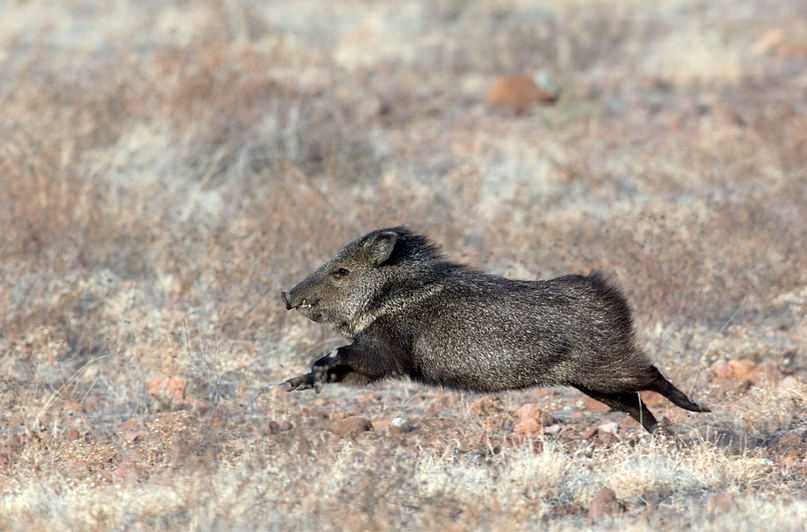
Peccaries are very fast for a few hundred yards, but speedily tire, lose their wind, and come to bay. Almost immediately one of these, a sow, as it turned out, wheeled and charged at Moore as he passed, Moore never seeing her but keeping on after another. The sow then stopped and stood still, chattering her teeth savagely, and I jumped off my horse and dropped her dead with a shot in the spine, over the shoulders. Moore meanwhile had dashed off after his pig in one direction, and killed the little beast with a shot from the saddle when it had come to bay, turning and going straight at him. Two of the peccaries got off; the remaining one, a rather large boar, was followed by the two dogs, and as soon as I had killed the sow I leaped again on my horse and made after them, guided by the yelping and baying. In less than a quarter of a mile they were on his haunches, and he wheeled and stood under a bush, charging at them when they came near him, and once catching one, inflicting an ugly cut. All the while his teeth kept going like castanets, with a rapid champing sound. I ran up close and killed him by a shot through the backbone where it joined the neck. His tusks were fine.
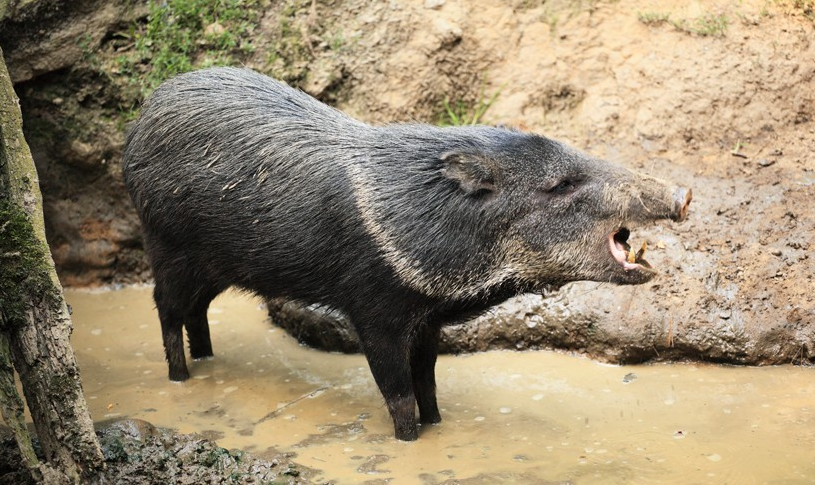
The few minutes’ chase on horseback was great fun, and there was a certain excitement in seeing the fierce little creatures come to bay; but the true way to kill these peccaries would be with the spear. They could often be speared on horseback, and where this was impossible, by using dogs to bring them to bay they could readily be killed on foot; though, as they are very active, absolutely fearless, and inflict a most formidable bite, it would usually be safest to have two men go at one together. Peccaries are not difficult beasts to kill, because their short wind and their pugnacity make them come to bay before hounds so quickly. Two or three good dogs can bring to a halt a herd of considerable size. They then all stand in a bunch, or else with their sterns against a bank, chattering their teeth at their antagonist. When angry and at bay, they get their legs close together, their shoulders high, and their bristles all ruffled and look the very incarnation of anger, and they fight with reckless indifference to the very last. Hunters usually treat them with a certain amount of caution; but, as a matter of act, I know of but one case where a man was hurt by them. He had shot at and wounded one, was charged both by it and by its two companions, and started to climb a tree; but as he drew himself from the ground, one sprang at him and bit him through the calf, inflicting a very severe wound. I have known of several cases of horses being cut, however, and the dogs are very commonly killed. Indeed, a dog new to the business is almost certain to get very badly scarred, and no dog that hunts steadily can escape without some injury. If it runs in right at the heads of the animals, the probabilities are that it will get killed; and, as a rule, even two good-sized hounds cannot kill a peccary, though it is no larger than either of them. However, a wary, resolute, hard-biting dog of good size speedily gets accustomed to the chase, and can kill a peccary single-handed, seizing it from behind and worrying it to death, or watching its chance and grabbing it by the back of the neck where it joins the head.
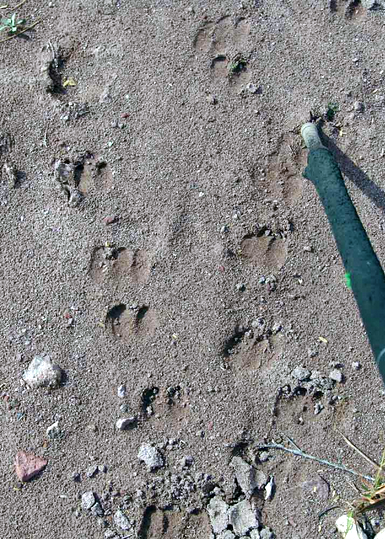
Peccaries have delicately moulded short legs, and their feet are small, the tracks looking peculiarly dainty in consequence. Hence, they do not swim well, though they take to the water if necessary. They feed on roots, prickly pears, nuts, insects, lizards, etc. They usually keep entirely separate from the droves of half-wild swine that are so often found in the same neighborhoods; but in one case, on this very ranch where I was staying a peccary deliberately joined a party of nine pigs and associated with them. When the owner of the pigs came up to them one day the peccary manifested great suspicion at his presence, and finally sidled close up and threatened to attack him, so that he had to shoot it. The ranchman’s son told me that he had never but once had a peccary assail him unprovoked, and even in this case it was his dog that was the object of attack, the peccary rushing out at it as it followed him home one evening through the chaparral. Even around this ranch the peccaries had very greatly decreased in numbers, and the survivors were learning some caution. In the old days it had been no uncommon thing for a big band to attack entirely of their own accord, and keep a hunter up a tree for hours at a time.

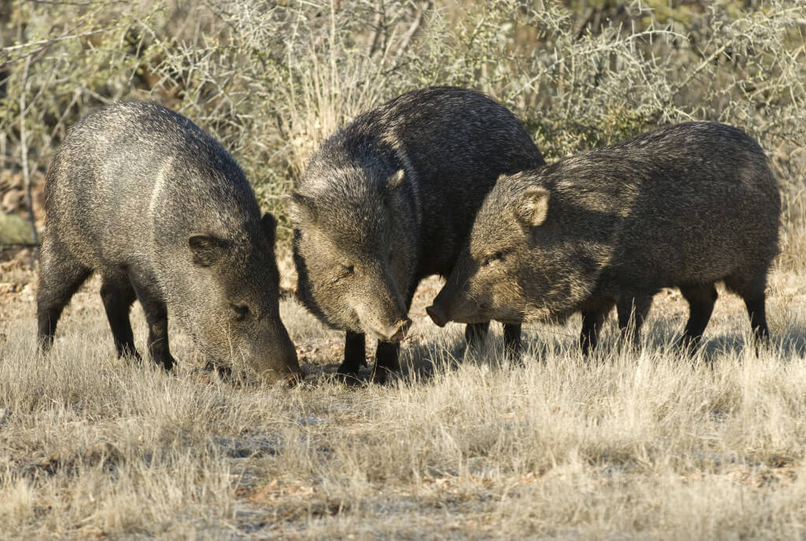


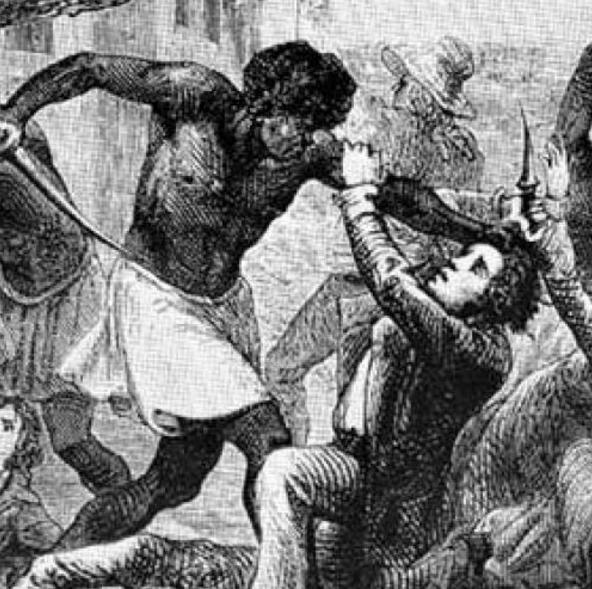





TR must never visited Arizona. Javelina are common here. I’ve hunted them and found the story accurate.
5